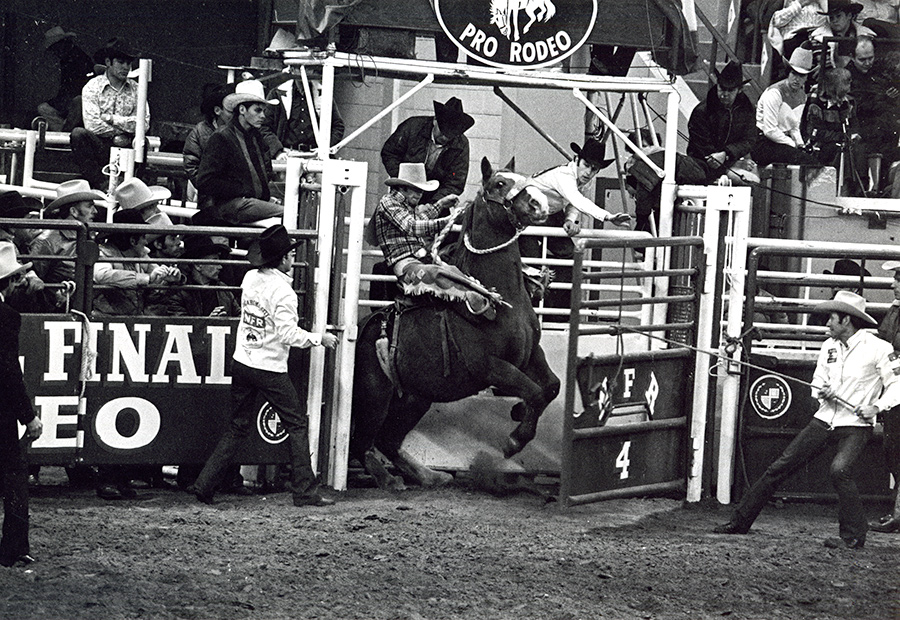The Encyclopedia of Oklahoma History and Culture
NATIONAL FINALS RODEO.
The National Finals Rodeo (NFR), known popularly as the "Super Bowl of rodeo," is a championship event held annually by the Professional Rodeo Cowboys Association (PRCA). That organization established the NFR in 1958 in order to determine the world champion in each of rodeo's seven main events: calf roping, steer wrestling, bull riding, saddle bronc riding, bareback bronc riding, team roping, and steer roping. The world championship steer roping competition has always been held separately from the regular NFR. The National Finals Rodeo showcases the talents of the nation's top fifteen money-winners in each event as they compete for the world title.
The first NFR was held in Dallas in 1959 and continued at that venue through 1961. From 1962 through 1964 Los Angeles hosted the competition. In 1964, however, Oklahoma City successfully bid to be the host city. In 1965 the first NFR in State Fair Arena drew 47,027 fans. The world event remained there through 1978 and thereafter was held in the Myriad Convention Center. Rodeo's premier attraction remained in Oklahoma City through 1984, bringing Oklahoma merchants an estimated annual revenue of $8 million. In 1984, however, the city of Las Vegas, Nevada, bid for the event. Although the Oklahoma City Council considered building a new thirty-million-dollar arena at the State Fairgrounds, the Las Vegas bid won.
During the rodeo's twenty years in Oklahoma City, both human and animal athletes turned in some memorable performances. In December 1967 Freckles Brown, who established an Oklahoma ranch after World War II, became the first man in history to stay eight seconds on the bull Tornado. That famous bull, which had thrown the previous 220 contestants, was owned by Jim Shoulders, another world-champion cowboy from Oklahoma.
Other national rodeo championship competitions have also been held in the state. The PRCA National Finals Steer Roping moved from Laramie, Wyoming, to the Lazy E Arena, in Guthrie, Oklahoma, for the 1984 event and continued there until 2001; the event returned to the Lazy E from 2009 through 2013. The Women's National Finals Rodeo was also held at the Lazy E from 1985 through 1993. Oklahoma is also home to the International Finals Rodeo (IFR), held annually since 1969 by the International Professional Rodeo Association (IPRA), which is based in Oklahoma City.
Bibliography
"City Has Its Fair Share of National Finals Memories," Daily Oklahoman (Oklahoma City), 6 December 1998.
"The Finals: Anniversary Stories," ProRodeo Sports News, 16 November 2000.
Kristine Frederickson, American Rodeo: From Buffalo Bill to Big Business (College Station: Texas A&M Press, 1985).
"Rodeo's Biggest Show Turns 40," Las Vegas (Nevada) Sun, 3 December 1998.
Citation
The following (as per The Chicago Manual of Style, 17th edition) is the preferred citation for articles:
Dianna Everett, “National Finals Rodeo,” The Encyclopedia of Oklahoma History and Culture, https://www.okhistory.org/publications/enc/entry?entry=NA008.
Published January 15, 2010
Last updated
November 14, 2024
© Oklahoma Historical Society



